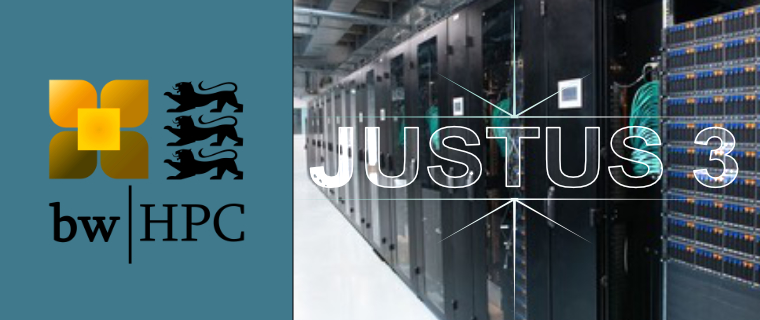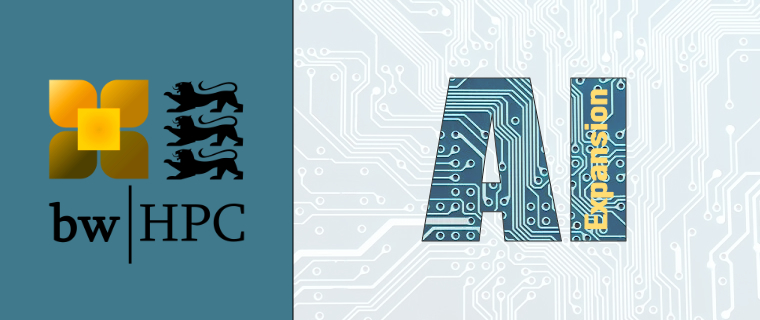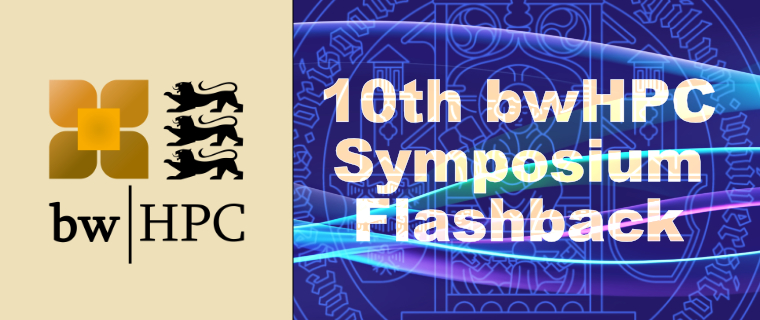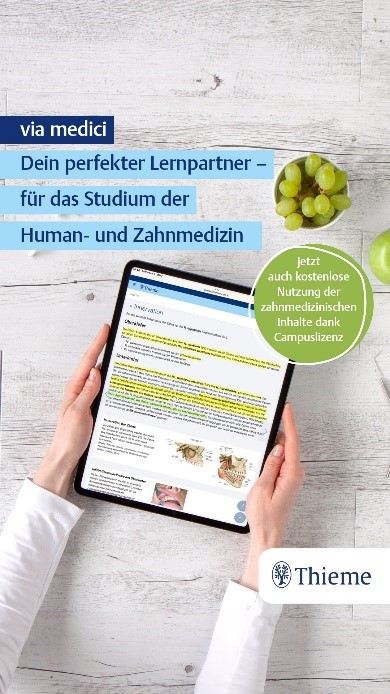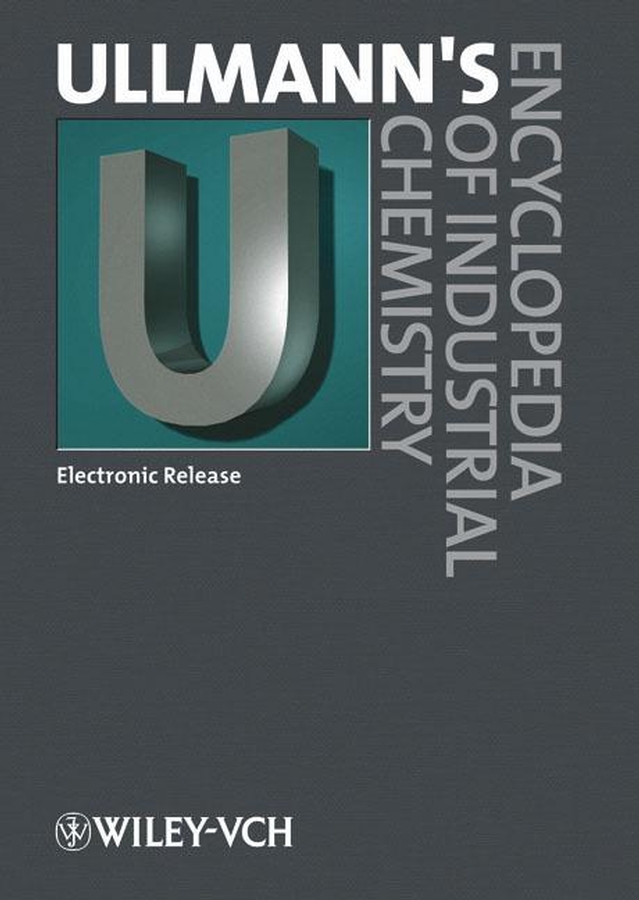
kiz Newsletter 11/2024
Dear readers!
There is a lot of good news: we welcome our new kiz director Prof. Wendzel. The new high-performance computer JUSTUS 3 has been approved. The expansion of GPU capacities will also strengthen AI research capacities in Ulm. Many sub-goals have been achieved in the campus portal project. Multi-factor identification has been introduced to increase IT security. A lot has happened in the area of e-resources. We look back on our presentations during this year's Open Access Week. Due to cost-cutting constraints, only emergency operation will be possible for TYPO 3 from January 2025 onwards. However, the translation options into English will be improved with the new release.
We wish you all a successful winter semester!
Your kiz PR team
A word from us
New head of kiz: Prof. Dr. Steffen Wendzel
In the first half of October, I took over the management of kiz as well as that of the Institute for Organisation and Management of Information Systems (OMI), which will be part of the Department of Computer Science in the future.
Previously, I was the scientific director of the Centre for Technology and Transfer at Worms University of Applied Sciences and a private lecturer at the FernUniversität in Hagen.
As part of my move to Ulm University, I am looking forward to many new and challenging tasks - in research, teaching and committee work. Challenging times lie ahead for kiz, for example in terms of available funding and filling vacant positions. However, kiz's history has always included the task and ability to adapt to constantly changing requirements. We will continue to face this challenge in the future. I am looking forward to diverse and interesting encounters on campus and look forward to working with you,
Steffen Wendzel

Topics of this newsletter
Account and access
Multi-factor authentication (MFA) for Ulm University
On 1 November 2024, Ulm University successfully introduced mandatory multi-factor authentication (MFA) for all access to the campus network via VPN and for access to the identity management system (IDM) following a months-long transition phase.
In the near future, kiz will connect further services to this existing MFA solution and thus achieve considerable additional security for its services and a further increase in the general level of protection. Specifically, kiz is already working on a solution for access to Moodle and for the services connected with single sign-on via Shibboleth. We will inform you about new developments in this area as soon as possible.
MFA involves a two-stage process in which the user first enters their login and password, and is then prompted to enter a time-based one-time password (TOTP) in a second step. This chosen procedure corresponds to the current state of the art and makes a significant contribution to increasing access protection to university resources and users' personal data.
MFA is just one individual measure that is embedded in a comprehensive security concept, designed to ensure the university's ability to respond to threats and enhances the availability, integrity and confidentiality of kiz services and your data.
We would like to take this opportunity to thank all users for their understanding of any inconvenience caused and for their cooperation.
Campus & Business
TYPO3 News
Emergency TYPO3 operation from January 2025
Due to staff shortages, the WebCMS/TYPO3 service can only be offered in emergency mode from 1 January 2025.
What this means for you:
- The website will continue to be available internally and externally.
- The WebCMS/TYPO3 and the web server will continue to be operated with high availability and an appropriate level of security. Security updates will be installed promptly.
- TYPO3 editors will continue to be able to create, change and delete their websites and content without restriction.
- Accounts for TYPO3 editors can still be logged in and out.
- Incoming tickets to the kiz helpdesk will be sorted and prioritised according to technical or functionally relevant incidents and individual support.
- Incidents are processed as far as this is possible in terms of personnel and finances.
- Individual support: Requests for individual support cannot be processed in emergency mode.
- Individual support and advice for TYPO3 editors and their questions about the functions and possibilities of TYPO3 is therefore no longer possible.
- The website will be frozen at the current level of functionality. Further developments will not be possible for the foreseeable future.
- Training courses for TYPO3 editors will not take place for the foreseeable future.
- The training websites and tutorials are still available.
Update to TYPO3 v12.4.x
In calendar week 50 we are planning an update of the TYPO3 CMS to the next major version 12.4.x.
During this time, the website is expected to be available without interruption except for a few minutes in the evening hours.
There are restrictions for TYPO3 backend editors. They will not be able to create new content for 1-2 days. During this time, the TYPO3 backend will be blocked. Editors will be informed separately.
The update is necessary to ensure the continued secure operation of the CMS.
Introduction of automatic translations with DeepL
A major innovation in TYPO3 is the introduction of automatic translations.
With the help of a TYPO3 plugin that integrates the translation service from DeepL.com into the TYPO3 backend, content can be translated within TYPO3.
For numerous content elements, you can have texts automatically translated into English by using the service from DeepL.
The university's own glossary for German-English translations is taken into account for the translated terms.
Of course, a final check by the university's Typo3-editors is required.
We hope that this will make it much easier for you to translate German content into English.
On the subject of data protection:
The service is offered in compliance with data protection regulations.
We would like to point out that when using the deepL translation service within TYPO3, your data will be sent to a deepL.com server and translated from there and sent back to TYPO3.
Our licence assures us that our data will be deleted from the DeepL server immediately after the translation process and that our data will not be used to train the AI behind it.
This is a distinguishing feature when using a DeepL API licence compared to the free service on the DeepL website.
Nevertheless, we recommend that you handle any personal data that may exist within TYPO3 in an appropriate manner.
The same applies to translations of any access-protected content.
"RKA" project for the digitalisation of business trip applications and travel expense reports
In November 2024, Ulm University will launch the "RKA" project to digitalise business trip applications and travel expense reports. The local project "RKA" is part of the state project "bwReise" in which 8 universities and numerous colleges in Baden-Württemberg are involved. The digitalisation of the travel process should make it possible to approve travel applications in an electronic workflow and process travel expense reports without media discontinuity. Improvements and simplifications for both travellers and approvers will be achieved by reducing copying, filing and dispatch work, recording data only once, increasing transparency, and speeding up process runtimes. The RKA travel expense programme from HIS eG will be used to support the entire business trip application and travel expense accounting processes.
A project team from Department III-1 Personnel Services and kiz-Informationssysteme will implement the project together with HIS eG by the end of 2026.
New information from the campus portal project
Application and admission (APP)
The project is on schedule for completion in December 2024. All Master of Science, Bachelor of Science and Bachelor of Education application procedures have been implemented and optimised. The applications that are still being submitted via ZUL GX are now also being fully imported into the new campus portal. These remaining procedures will be successively converted to the new campus portal by the end of the project. Over the next few months, the processes that have not yet been recorded will be mapped. These will serve as the basis for the operating concept.
Student Management (STU)
The HISinOne STU project will also be completed at the end of 2024. Many suggestions have contributed to the system being optimised and students being able to use a user interface. Over the next few months, we will finalise and complete the operating concept and technical documentation. In addition, we want to convert the student file to new document management software so that students can request and retrieve certificates directly and digitally in the campus portal.
Examination and event management (EXA)
We are working intensively on the preparation of this project (start: January 2025, changeover: autumn 2028). The contract with HIS eG has been concluded. We have started to recruit the additional staff required. The EXA competence team, consisting of study programme coordinators from all faculties, has started to prepare the processes in course management. This is being carried out in close coordination with the Student Administration Office, which will be analysing each of the examination management processes over the coming weeks.
Research Management (RES)
In research management, the test phase for the first milestone "projects/third-party funding notification" has now started with end users (university and university hospital administrators and researchers). At the same time, preparations are being made to go live with this milestone and an intensive exchange is taking place with other universities to adapt the system to the university's requirements in an effective and user-friendly way.
Doctoral student management (DOC)
This portal is for doctoral candidates and those interested in doing a doctorate, as well as the relevant administrative staff, and is gradually taking shape. However, the go-live has been delayed and is now planned for next year. The main reason for this is new features that are important to us and will not be available until the new release in spring 2025. We expect that the migration of existing records will also be largely completed by then.
Personalised services and directories, infrastructure (PSV)
In the PSV sub-project, the complete import of personal records from SVA to HIO DEV2 was completed in the third quarter of 2024. The majority of the imported persons were then automatically synchronised with the organisational structure. The imported persons are assigned the initial role of employee at the corresponding organisational unit. The procedure could be replicated on the RES/DOC configuration column. A synchronised data status between the configuration column and the RES/DOC test column was achieved by importing a database dump on the test system.
The project structure itself was also adapted. Previously, responsibilities in the area of PSV were not clearly defined and the work was largely not embedded in the project in a future-proof manner. To counteract this, Eugen Frasch was appointed as the technical sub-project manager in addition to Thomas Bednarsky as the technical sub-project manager. This is intended to ensure that the technical requirements can be better measured and implemented on the basis of the IT requirements. The new team is initially focusing on identifying processes that are already taking place but are very unregulated, organising and consolidating them and then making them usable for the project team members in the overall HIO project.
Business Intelligence (BI)
The HISinOne-BI reporting component integrated into HISinOne is to be the leading central system for key figures from the areas of campus management and research in the future. Statistical surveys for the Ministry of Science and Culture have already been carried out. The regular delivery of student and examination statistics to the State Statistical Office is currently in preparation. It is planned to replace the reports on students and final examinations previously offered in the SAP reporting portal with implementations in HISinOne BI at the beginning of 2025.
Scientific computing
JUSTUS 3: Funding Approval
Ulm University is proud to announce the upcoming arrival of JUSTUS 3, a state-of-the-art high-performance computer, made possible by a substantial funding of 2.1 million euros from the German Research Foundation (DFG). This initiative, part of a Major Research Instrument Proposal, totals 4.2 million euros, reflecting a collaborative effort that includes contributions from the state and investments from the universities of Ulm and Stuttgart.
JUSTUS 3 is set to enhance research capabilities across over 100 projects, focusing on cutting-edge fields such as battery research and quantum sciences. With a proven track record of supporting more than 1,300 scientific publications, the new supercomputer promises to exceed its predecessor in both computing power and energy efficiency.
Minister of Science Petra Olschowski highlighted Baden-Württemberg's leadership in supercomputing, emphasizing the significant role of Ulm University in advancing research in theoretical chemistry, quantum physics, and solid-state physics. Professor Joachim Ankerhold noted the incorporation of sustainable technologies in JUSTUS 3, while Jürgen Salk acknowledged the collaborative efforts of over 40 scientific groups in shaping this initiative. The technical specifications will be finalized through an EU-wide tender process, ensuring alignment with user needs and future advancements, including AI capabilities.
Further information:
Baden-Württemberg Invests Over Three Million Euros to Boost AI Research Infrastructure
In a significant commitment to advancing Artificial Intelligence (AI) research, the Ministry of Science, Research, and Arts of Baden-Württemberg has announced funding exceeding three million euros as part of the "Strengthening of AI Infrastructure" (SKII) initiative. This funding, effective from January 2024 to June 30, 2025, aims to enhance the AI research capabilities across the state by procuring essential hardware, software, and services to support innovative AI projects.
The initiative will benefit all bwHPC cluster sites, including Freiburg, Tübingen, Heidelberg, Ulm, and Karlsruhe, with a focus on enhancing GPU capabilities. Minister of Science Petra Olschowski emphasized the critical role of AI in various fields, stating, "To remain internationally competitive, we are expanding the computing capacity for AI research."
Michael Weber, Chairman of the State Rectors' Conference, highlighted the initiative's potential to accelerate research and technology transfer, particularly for young researchers. "This new program is a win for the entire state," he remarked. The funding is set to empower researchers to conduct their projects more efficiently, fostering innovation and collaboration across disciplines.
Further information:
10th bwHPC Symposium Showcases Innovations in High Performance Computing
The University of Freiburg proudly hosted the 10th bwHPC Symposium on September 25-26, 2024, bringing together over 80 experts, researchers, and enthusiasts in the field of High Performance Computing (HPC). This premier event featured a robust program of 23 scientific presentations, workshops, and tutorials, highlighting the latest advancements in HPC technology.
The symposium kicked off with an introductory tutorial on HPC and a workshop focused on scientific programming with Python. A standout moment was the evening lecture by Marek Dynowski from the Cancer Research UK Manchester Institute, titled “Keep calm and carry on - Cancer Research in Turbulent Times.”
Day two commenced with a keynote address by Joachim Ankerhold from the University of Ulm on “High Performance and Quantum Computing.” The agenda included scientific presentations, poster sessions, and the inauguration of the bwForCluster NEMO2, culminating in a panel discussion and awards for outstanding contributions.
Key topics included the convergence of HPC with broader user groups and the significance of Green IT, with presentations addressing sustainable practices in research environments. The symposium was free of charge and welcomed participants from all scientific disciplines.
We look forward to seeing the participants again at the next bwHPC Symposium in 2025.
Further informations:
Scientific information services
Research data management basic course
New in WS 2024/25:
Research data management for students (interdisciplinary; self-study)
In the current winter semester 2024/25, kiz is offering an online self-study course on the basics of research data management for the first time. The course teaches what research data is, which steps the data life cycle covers and how you can make your data reusable.
Overview of course content:
- What is research data and what is research data management?
- The life cycle of data and the FAIR principles
- How do I make data reusable and what are the benefits of sharing it?
- Legal aspects of handling research data
The course is flexible in terms of time and can be completed in German or English. After successfully passing a test, you will receive a certificate of participation and are ready for a successful research data publication, e.g. on OPARU.
Registration and materials:
Contact persons and further information can be found in the training portal of the Ulm University. Registration for the course takes place via Moodle.
International Open Access Week 2024 in Ulm
What Open Access funding opportunities are available at Ulm University? What is behind the term ORCID? And how does the development of artificial intelligence influence the debate on Open Access? These topics were at the centre of this year's Open Access Week at kiz.
A total of four 90-minute online lectures were held from 21 to 24 October. The topics were publishing in Open Access transformation contracts and the visualisation of research profiles with the persistent researcher ID ORCID. Two further contributions dealt with the question of open access in research proposals and the role of Creative Commons licences at a time of data-hungry AI models.
In the discussions following the presentations, the issue of authors' rights was frequently raised. This is a crucial issue in view of the growing market concentration on a few publication organs and in view of exclusive data access agreements for the training of artificial intelligence. Securing free access to scientific content now seems more important than ever.
However, the supposed protection of a licence with an NC component is misleading. This is because authors often transfer the exclusive rights of use to the publisher when choosing such a licence. As soon as the publishers have these, they alone can decide whether the content may be licensed by AI companies and used for commercial machine learning - without the authors being able to object or claim remuneration.
This is in contrast to the CC BY licence https://creativecommons.org/licenses/by/4.0/deed.de, which is the most open of the CC licences and also includes commercial reuse. It strengthens authors' rights precisely because the content does not belong exclusively to a few publishing organisations, but is freely available and reusable worldwide. The DEAL consortium, for example, has also launched an information campaign advising people to choose CC BY: https://deal-konsortium.de/warum-ccby. This was also commented on extensively in in-depth follow-up discussions following the presentations.
Using open access for funding applications
Publication workshop for postdocs
Open access mandates are playing an increasingly important role in research funding. Be it Open Access publication obligations, as in the current EU Framework Programme for Research and Innovation "Horizon Europe", or Open Science concepts in applications for postdoctoral fellowships - researchers are now under increasing pressure to include the topic of Open Access in their applications.
The course "Using Open Access for funding applications. Publication workshop for postdocs" is designed in response to this development. It provides participants with guidelines on how freely accessible secondary publications, i.e. green open access, contribute to a successful publication strategy. To this end, all questions that a research group should clarify in the course of the publication process are dealt with step by step: Authorship and ORCiD, journal or conference target lists, open access funding conditions, a publication of the preprint, green open access (postprint), and scholarly communication.
The course is primarily aimed at people who have completed their doctorate as well as others who have already gained initial publication and application experience. It takes place online during the semester, once in German and once in English.
AI in studies as a new part of the ASQ course
New course section on AI as part of the ASQ course "Scientific work and writing: Core Competencies"
AI is now playing an increasingly important role in scientific work and the Publication Management team is also looking closely at this topic.
The first result was a new section entitled "AI in studies - developing information skills" as part of the ASQ course "Academic work and writing: Core Competencies". The main aim is to familiarise students with the opportunities, but also the risks, and to learn how to assess them in order to be able to deal with AI confidently. Questions about the compatibility of AI and copyright and new challenges for research and teaching due to AI will also be addressed.

Library use
DBIS & EZB Relaunch
New database information system DBIS
The database information system DBIS has had a re-design since 15 October 2024! With the latest version, the layout and user interface have been completely revised to make it modern and intuitive to use. With the relaunch, an English language version is now also available.
DBIS helps you to find the right databases for your research needs. In DBIS we show you which databases are freely available and provide you with access to our licensed databases.
The new DBIS version was developed as part of a DFG project (funded by the German Research Foundation (DFG) - 440516279). The Regensburg University Library, in broad co-operation with the (inter)national library system, further developed the database information system into a web service closely aligned to the new needs of users. DBIS lists all important information on databases, enables a quick and well-founded selection and allows individual views to be flexibly customised. Over 370 participating institutions are working together cooperatively, including us!
New functions in the Electronic Journals Library EZB
The EZB electronic journal library has been completely revised and has been given various new functions. The journal display is now structured into three overarching levels:
- Online availability
- Publishing in this journal
- Information about the journal
The available licenses are listed in the Online availability tab. In addition to regular subscriptions, which can usually be accessed in the university's IP range directly on the publisher's website, electronic access is often also offered via so-called aggregators (such as JSTOR, Ovid or EBSCOHost). In these cases, users cannot see on the publisher's website whether a local license exists, and EZB helps to check licensed volumes and to obtain the correct access link.
The new Publish tab has been available in this magazine since October 2024. This has been completely reimplemented and will continue to be supplemented with additional functions in the coming years. The section is divided into the following content elements:
- Check secondary publication rights
- Check funding opportunities for Open Access
- Price information from the DOAJ (for Open Access journals)
- Cost information from OpenAPC
If you do not wish to carry out a search at journal level, you can use the "Article retrieval" function to query the license status using a DOI.
Via Medici Dentistry
via medici campus license: now including dentistry
In the summer semester, the Faculty of Medicine together with kiz made via medici available as a central learning tool for studying human medicine (see newsletter article from June 2024).
Via medici is now also available for dental students at the University of Ulm. The corresponding module was activated in August 2024. The publisher provides information on the via medici platform at the following link: https://viamedici.thieme.de/landing-page/campuslizenz-ulm
Instructions for the registration process are available at the following link: https://viamedici.thieme.de/landing-page/inhalte-freischalten
New electronic information resources
Update of the Ullmann's Encyclopedia of Industrial Chemistry
The Ullmann's Encyclopedia of Industrial Chemistry is up to date again. You can access it via the following link from the campus network: https://onlinelibrary.wiley.com/doi/book/10.1002/14356007
The archive years 2021-2024 and updates for 2025 have been added. Ullmann's is considered a standard work for chemistry, chemical and life sciences and covers inorganic and organic chemicals, modern materials, pharmaceuticals, polymers and plastics, metals and alloys, biotechnology and biotechnological products, food chemistry, process engineering and plant operation, analytical methods, environmental protection and other areas. It is a key reference for chemical engineering knowledge in particular.
Dorsch Dictionary of Psychology
The Encyclopedia of Psychology is now also available electronically at https://dorsch.hogrefe.com/ in addition to the print edition. The database contains around 13,000 individual articles and enables reliable and citable research into basic principles, terms, concepts and areas of application. The contents are structured according to 19 psychological fields, which provide an informative introduction and orientation and name the most important keywords.
NEJM Artificial Intelligence
NEJM Artificial Intelligence, a new journal funded by the Faculty of Medicine, is now available on the campus network. The journal was launched in 2024 and deals with the latest applications of artificial intelligence and machine learning in clinical medicine.
Web of Science Research Assistant
The Research Assistant, a new generative AI-supported tool, has been available in the Web of Science Core Collection since 1 October 2024. Initial access has been granted for a limited period of one year in response to requests from the specialist departments, partly in order to test new research methods in controlled databases with generative AI systems.
The Research Assistant uses technology from OpenAI in the Web of Science's own database and thus enables natural language, multilingual search functions, concise overviews of results, task-based instructions and visualisations. This significantly expands the previously known search functions of the Web of Science. The Research Assistant can help to find answers to research questions and context-related queries and thus help to explore possible further avenues for one's own research. The provider describes the following suitable application scenarios for the Research Assistant: exploring a topic, starting a literature search, searching for a journal in which you would like to publish and identifying experts in a specific field. Further information on AI and the technology behind it can be found directly from the provider.
Opening hours and closure at the turn of the year
Shared learning experience at kiz library centre
and at the Helmholtzstr. 18 departmental library
Large reading room, individual workstations, work booths, group work, printers and scanners, vending machine cafeteria, chill zones
Opening Hours Winter Semester 2024/25
kiz Library Centre:
| Mon - Thu | 8 am - 8 pm |
| Fri | 8 am - 6 pm |
| Sat | 10 am - 4 pm |
Extended opening hours from
07.01.2025 - 14.03.2025:
| Mon - Thu | 8 am - 10 pm |
| Fri | 8 am - 8 pm |
| Sat - Sun | 10 am - 8 pm |
Departmental Library Helmholtzstr. 18:
| Mon - Fri | 8 am - 4 pm |
Closing Days of the Library Learning Locations & Service Points
| 23.12.2024 - 06.01.2025 |
At the turn of the year our learning locations and service points will be closed due to a general lowering of the central heating:
- Library learning locations and corresponding services
- Service-Point Print
- Service-Point Publication Management
Have a good start into the new year!











